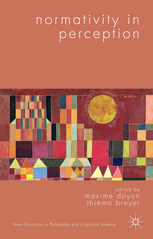DISCUSSIONI / Emanuela Carta /
Recent years have witnessed an increasing interest in the nature and functions of norms; to the extent that it may be said that there has been a normative turn in contemporary philosophy. The twelve essays collected in this volume reflect this growing interest. As the editors Maxime Doyon and Thiemo Breyer explain in the introduction, normativity does not just belong to the moral or the ethical, but it rather concerns all facets of philosophical reflection, inasmuch as human action in general is guided with more or less motivational strength by norms of all kinds. In particular, the primary goal of the volume is to shed light on a specific dimension of normativity that, according to the editors, has not yet received the attention it deserves; that is, the dimension of perceptual normativity. In fact, whereas questions concerning the nature and functions of norms in perceptual experience have been examined for quite some time within analytic philosophy as, for example, thanks to John McDowell’s Mind and World, it is only very recently that perceptual normativity has been explicitly thematized within phenomenology; in particular, by Steven Crowell’s Normativity and Phenomenology in Husserl and Heidegger. Indeed, it is ever more clear thanks to recent contributions like these that philosophers such as Edmund Husserl, Maurice Merleau-Ponty, and Martin Heidegger have not only dealt with normativity in their writings, but their works are interestingly relevant for the recent debate about perceptual normativity.


